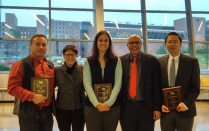
Diana Ramirez-Rios
PhD
Research Topics
Disaster Response Logistics, Freight Logistics, Supply Chain Optimization
Research Overview
I am passionate about policy-driven, empirical, and multidisciplinary research. My work focuses on freight transportation, supply chain and logistics, and humanitarian/disaster response logistics. My work includes freight demand modeling, parking vehicle simulation, facility location, post-disaster distribution modeling, and cooperative game-theoretic models. Practice and policy-driven research include evaluation of freight externalities, implementation of policy initiatives for sustainable urban freight systems, and cooperation models of industry supply chains. My empirical research includes the economic valuation for the lack of relief supplies in post-disaster response, freight trip generation and service trip generation models, and parking duration. I have strong theoretical foundations in operations research, statistical analyses, and economics.
My research work in freight and disaster response logistics considers the welfare of vulnerable communities. In my disaster response logistics work, I have proposed models that reduce the suffering of vulnerable populations affected by the disaster. I developed continuous-approximation models to solve the facility location (FL) problem, where the CA models of non-linear deprivation costs reduce the complexity of the FL model with continuously distributed demand. These models can be extended to stochastic formulations and dynamic time-dependent settings, common in disaster response. In the freight transportation side, I use empirically driven freight demand models to minimize the pollutants produced by freight vehicles to the communities. I develop optimal routing and location models for more sustainable modes of transportation for the last mile delivery. I also utilize simulation models in freight logistics, especially to estimate parking needs in urban areas.
